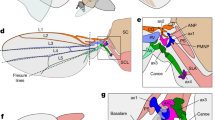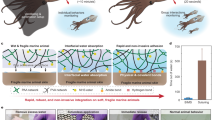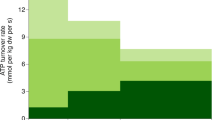Abstract
MECHANICAL performance of skeletal muscle has long been the subject of intense interest1, but the details of in vivo performance of individual skeletal muscles during normal locomotion remain largely unknown. Performance in vitro has been described with considerable precision under simplified loading conditions2. The force production and shortening velocity of most muscles, however, probably change continuously during natural movements. Therefore, modelling in vivo performance on the basis of in vitro contractile properties3 is subject to large degrees of uncertainty. Designing in vitro experiments that effectively examine the limits of mechanical performance requires increasing knowledge of precisely how muscles are used during normal movements. We report here measurements of the mechanical performance of the adductor muscle in scallops during jet-propulsion swimming. Swimming in scallops is powered solely by the striated portion of the single adductor muscle. Exploiting this simple locomotor morphology with simultaneous high-resolution measurements of pressure and flow rate, we have recorded nearly instantaneous measurements of the performance of a single skeletal muscle during normal locomotion.
This is a preview of subscription content, access via your institution
Access options
Subscribe to this journal
Receive 51 print issues and online access
$199.00 per year
only $3.90 per issue
Buy this article
- Purchase on Springer Link
- Instant access to full article PDF
Prices may be subject to local taxes which are calculated during checkout
Similar content being viewed by others
References
Hill, A. V. J. Physiol., Lond. 53, lxxxviii–xc (1920).
Woledge, R. C., Curtin, N. A. & Homsher, E. Energetic Aspects of Muscle Contraction (Academic, New York, 1985).
Vanleeuwen, J. L. J. theoret. Biol. 149, 229–256 (1991).
Yonge, C. M. Mem. Mus. R Hist. Nat. Belg. 3, 77–100 (1936).
Lowy, J. J. Physiol., Lond 124, 100–105 (1954).
Wilkens, L. A. Proc. R. Soc. B211, 341–372 (1981).
Mellon, D. Jr. Z. vergl. Physiol. 62, 318–336 (1969).
Trueman, E. R. J. exp. Biol. 30, 453–467 (1953).
Gade, G., Weeda, E. & Gabbott, P. A. J. comp. Physiol. 124, 121–127 (1978).
Wang, C. Y. & Sonnenblick, E. H. J. Biomech. 12, 9–12 (1979).
Daniel, T. L. Am. Zool. 24, 121–134 (1984).
Moore, J. D. & Trueman, E. R. J. exp. mar. Biol. Ecol. 6, 179–185 (1971).
Davies, C. T. M. & Sandstrom, E. R. Eur. J. appl. Physiol. 58, 838–844 (1989).
Edgerton, V. R., Roy, R. R., Gregor, R. J. & Rugg, S. in Human Muscle Power (eds Jones, N. L., McCartney, N. & McComas, A. L.) 43–64 (Human Kinetics, Champaign, Illinois, 1986).
Bennet-Clark H. C. J. exp. Biol. 63, 53–83 (1975).
Author information
Authors and Affiliations
Rights and permissions
About this article
Cite this article
Marsh, R., Olson, J. & Guzik, S. Mechanical performance of scallop adductor muscle during swimming. Nature 357, 411–413 (1992). https://doi.org/10.1038/357411a0
Received:
Accepted:
Issue Date:
DOI: https://doi.org/10.1038/357411a0
This article is cited by
-
Convergent and parallel evolution in life habit of the scallops (Bivalvia: Pectinidae)
BMC Evolutionary Biology (2011)
-
Invertebrate muscle performance at high latitude: swimming activity in the Antarctic scallop, Adamussium colbecki
Polar Biology (2005)
-
The work that muscles can do
Nature (1992)
Comments
By submitting a comment you agree to abide by our Terms and Community Guidelines. If you find something abusive or that does not comply with our terms or guidelines please flag it as inappropriate.



